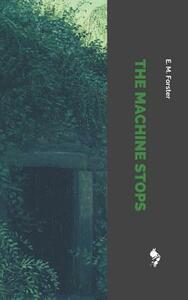Take a photo of a barcode or cover
A 1909 science fiction novelette by an author who is much better known for A Room with a View and other non-SF titles. Although this seems to be an outlier in the E. M. Forster canon, it is an impressive piece of futuristic forethought.
In the world of The Machine Stops, humanity lives in massive apartment complexes underground, where they can control the atmosphere and shield themselves from the inhospitable air above ground. People appear to value a certain kind of purity very highly - namely, the purity of a self that is unpolluted by contact with the world outside one's apartment.
One marvels at the prophetic prowess that this short work seems to possess. Many aspects of the world Forster imagines here really do invoke the information-age society. You can draw parallels between The Machine Stops and the pseudo-socialization of social media, zoom fatigue, the potential pitfalls of working from home, being removed from the reality of fighting for survival, international air travel, and more.
Here's the part of the novelette that spoke to me the most. Forster's humanity loves to find and acquire new ideas - and not just any ideas, but "second-hand", or better yet, "tenth-hand" ideas. You don't want to learn about the French Revolution and form your own ideas based on primary sources. Instead, you want to learn what experts say about the event - or rather, what judgements later commentators have to proclaim over the historians' analysis. Layers and layers of the analyses of previous analyses build up, and in the meantime the reality of what actually happened in France during the Revolution is dissolved by a game of broken telephone.
There's an undercurrent of authoritarianism in this society - Forster invokes religion, which apparently is both dead and very much alive in this future world. This is where the novelette's weaknesses start to come out. Because Forster packs a lot into a very short space, The Machine Stops reads more like an outline for a novel than a piece that stands on its own two legs.
Perhaps because of the limited space, I didn't feel immersed in the world of Forster's imagination. Instead, it felt like a list of genuinely impressive ideas that were glued together with dialogue. As Paul Hollywood once said, the flavors are good, but it's underbaked.
In the world of The Machine Stops, humanity lives in massive apartment complexes underground, where they can control the atmosphere and shield themselves from the inhospitable air above ground. People appear to value a certain kind of purity very highly - namely, the purity of a self that is unpolluted by contact with the world outside one's apartment.
One marvels at the prophetic prowess that this short work seems to possess. Many aspects of the world Forster imagines here really do invoke the information-age society. You can draw parallels between The Machine Stops and the pseudo-socialization of social media, zoom fatigue, the potential pitfalls of working from home, being removed from the reality of fighting for survival, international air travel, and more.
Here's the part of the novelette that spoke to me the most. Forster's humanity loves to find and acquire new ideas - and not just any ideas, but "second-hand", or better yet, "tenth-hand" ideas. You don't want to learn about the French Revolution and form your own ideas based on primary sources. Instead, you want to learn what experts say about the event - or rather, what judgements later commentators have to proclaim over the historians' analysis. Layers and layers of the analyses of previous analyses build up, and in the meantime the reality of what actually happened in France during the Revolution is dissolved by a game of broken telephone.
There's an undercurrent of authoritarianism in this society - Forster invokes religion, which apparently is both dead and very much alive in this future world. This is where the novelette's weaknesses start to come out. Because Forster packs a lot into a very short space, The Machine Stops reads more like an outline for a novel than a piece that stands on its own two legs.
Perhaps because of the limited space, I didn't feel immersed in the world of Forster's imagination. Instead, it felt like a list of genuinely impressive ideas that were glued together with dialogue. As Paul Hollywood once said, the flavors are good, but it's underbaked.
لم أجد العبارات الكافية لأصف عبقرية فروستر و حدة تبصره بما يخفيه تطور البشرية لنا. قصة خطها فورستر في عام 1909 و كأنها تحكي واقعنا مع التكنولوجيا الآن.
من شدة اعجابي بهذه الرواية، وصل بي الأمر أني أزعجت من حولي. فأحكي لهم عنها دون خوض في تفاصيلها لكن من باب مشاركة ما تطرب إليه النفس. لكل من يستهويه مستقبل البشرية، قد تكون هذه القصة بداية شيقة.
I did not find enough words to describe Froster's genius and the sharpness of his insight into what human evolution hides for us. A story written by Forster in 1909 as if it tells our reality with technology now. Because of my great admiration for this novel, it came to the point that I annoyed those around me. So I tell them about it without going into its details, but for the sake of sharing what the soul desires. For anyone interested in the future of humanity, this story could be an interesting start.
من شدة اعجابي بهذه الرواية، وصل بي الأمر أني أزعجت من حولي. فأحكي لهم عنها دون خوض في تفاصيلها لكن من باب مشاركة ما تطرب إليه النفس. لكل من يستهويه مستقبل البشرية، قد تكون هذه القصة بداية شيقة.
I did not find enough words to describe Froster's genius and the sharpness of his insight into what human evolution hides for us. A story written by Forster in 1909 as if it tells our reality with technology now. Because of my great admiration for this novel, it came to the point that I annoyed those around me. So I tell them about it without going into its details, but for the sake of sharing what the soul desires. For anyone interested in the future of humanity, this story could be an interesting start.
My husband and I read this novella aloud to one another, when one of our neighbors loaned it to us, telling us we absolutely *had* to read it. The concept is certainly intriguing, depicting a futuristic world in which everyone lives underground, in private rooms in which "the Machine" (which is like the internet sort of, only it's connected to literally everything in the room) does everything for them. It keeps them alive. It manages their food intake, provides their bed, gives them medicine when they need it, maintains their climate, and gives them a medium by which they can interact with other humans without ever leaving their rooms. It's so central to life in this society that it's literally worshipped as God, and the manual of the Machine becomes like the Bible. But what happens when the Machine begins to break down, and when it finally stops?
It's not a happy story, but it didn't end up being too terribly depressing either because it wasn't engaging enough. The ending seemed almost an arbitrary place to stop. I wonder why our neighbor thought we needed to read the book... I assume it's a reference to how people interface with one another largely via zoom and social media? I do see some similarities to our society but I'm not quite sure what I was supposed to get out of it.
It's not a happy story, but it didn't end up being too terribly depressing either because it wasn't engaging enough. The ending seemed almost an arbitrary place to stop. I wonder why our neighbor thought we needed to read the book... I assume it's a reference to how people interface with one another largely via zoom and social media? I do see some similarities to our society but I'm not quite sure what I was supposed to get out of it.
The Machine Stops was almost hard to believe it wasn't contemporary. Full of fear for an isolationist future despite the technology making travel so fast. Most pertinent line probably: "there will come a generation that has got beyond facts, beyond impressions". E.M.Forster had our number!
The Celestial Omnibus was short and should have been full of joy but was somewhat disheartening because the boy was already so overshadowed and dampened by parental and general adult "properness". A tale of warning about losing the poetry of the spirit. It deserves to be illustrated to celebrate all the coming together of authors and poets and their characters!
The Celestial Omnibus was short and should have been full of joy but was somewhat disheartening because the boy was already so overshadowed and dampened by parental and general adult "properness". A tale of warning about losing the poetry of the spirit. It deserves to be illustrated to celebrate all the coming together of authors and poets and their characters!
dated but relevant
Interesting to read because it’s dated but the fears it evokes are not. Feels a little quaint and deep at the same time
Interesting to read because it’s dated but the fears it evokes are not. Feels a little quaint and deep at the same time
Fascinating
It is amazing that this story was conceived in1909. The concept is terrifying when you consider our current state of affairs. Imagine if all of a sudden the internet wasn't!
It is amazing that this story was conceived in1909. The concept is terrifying when you consider our current state of affairs. Imagine if all of a sudden the internet wasn't!
This was such a short but very profound read. E.M Forster was way ahead of his time.
Damn. Most prescient thing I've ever read in my life. Dude predicted the Metaverse and internet-age pandemic self-isolation in 1909. What?!
One of my favorite books that I have had to read for school. Even though it was written in 1909 the themes are still very relevant today. I quick read and a definite nerdy recommendation.



